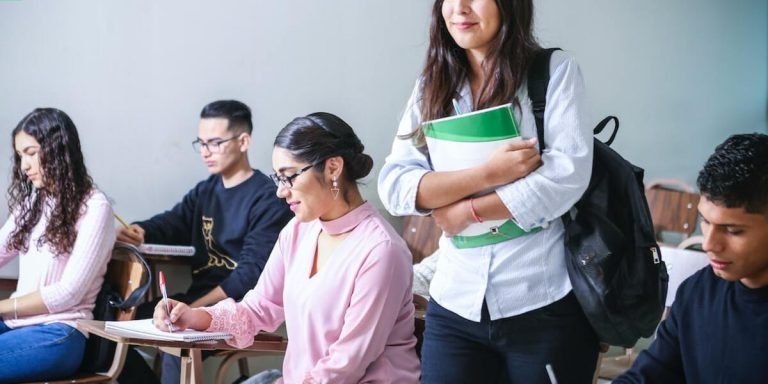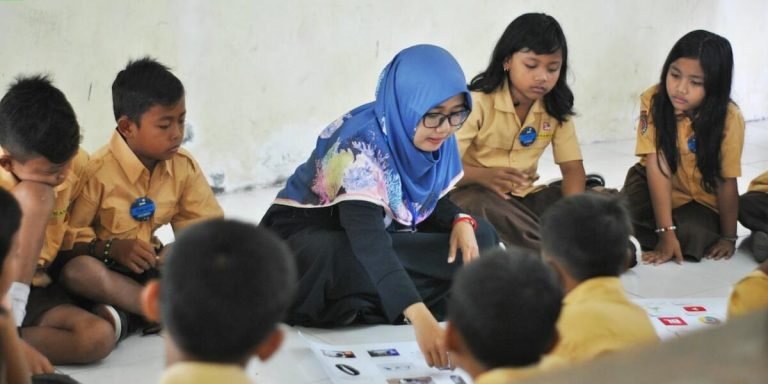Parent-Teacher Conference: Fostering Effective Communication for Child Development
Navigating through the maze of formal education for their child can be daunting, and hence it’s vital that parents actively participate in every aspect of this journey. The parent-teacher conference plays a significant role here as it serves as an essential bridge between home and school environment. This meeting cultivates mutual understanding and fosters enhanced communication centered around each child’s individual needs.
However, making the most out of a parent-teacher conference isn’t easy due to various factors such as time constraints or lack of clarity about what questions to ask, among others. The following sections will provide valuable suggestions on how you could prepare better for these conferences — keeping your focus sharply on constructive dialogue emphasized towards supporting your child’s developmental growth within both learning spaces: at school with educators and at home with you.
Did you know?
A study by Harvard Family Research Project found that students achieve higher when schools and parents communicate effectively, proving parent-teacher conferences are vital catalysts for better academic outcomes.
Maximizing Communication: Strategies for Parent-Teacher Conferences
Understanding the vital role of technology integration in education, parent-teacher conferences have evolved into platforms where both parties can discuss strategies and tools to promote a productive digital learning environment. In today’s fast-paced world particularly marked by the COVID-related disruptions of 2023, these face-to-face encounters serve as an opportunity for parents and teachers alike to refine educational methods that support learners’ needs.
One crucial aspect is maintaining fluid communication between educators and caregivers. Leverage modern applications like messaging apps or online portals during conferences – not only do they simplify correspondence but also offer convenience with scheduling meetings or sending out updates about children’s progress. By using such tech devices, discussions become less tedious, more focused on essential topics concerning students’ academic performance.
Moreover, maximizing communication involves collaborative decision-making regarding appropriate edtech use at home. Parents need guidance from teachers who are trained in this field so they can correctly implement software programs meant to enhance their kids’ comprehension skills outside school hours too – making distance learning seamless even amidst pandemic-driven interventions like remote study setups introduced since 2020 up until now.
Preparing Key Discussion Points Ahead of Time
As active participants in your child’s education, it is imperative to prepare key discussion points before a parent-teacher conference. Understanding the impact of technology integration in education on your child’s learning process can be an essential part of this preparation.
Before you set foot into the classroom for that critical meeting, spend some time understanding where your child stands academically and socially. Is there a question about their performance? Do you have concerns regarding their interaction with peers or handling of school work?
These considerations form an excellent base for establishing the crucial talking-points.
Next, focus on how technology is being utilized within classrooms today and its relevance to future careers. In 2023, edtech developments like digital textbooks, online homework assignments, virtual reality field trips are not only innovative but also widely adopted tools transforming traditional teaching methods worldwide. Ask if these resources are available at school and inquire how they’re contributing towards enhancing students’ skills such as analytical thinking & problem-solving.
Since Parental involvement has become more streamlined due to advancements like parent portals – platforms providing real-time access to children’s grades and attendance records; ask questions related: Like whether teachers send out regular updates through this medium?
Furthermore discuss any specific technologies integrated directly into curriculum—an iPad program perhaps or use of interactive whiteboards during lessons—and elucidate educators’ rationale behind such implementations.
Remember though while discussing tech-integration do not neglect behavioral aspects which although may seem unrelated but often get impacted when dealing with new technologies causing anxiety or overstimulation among certain students.
Establishing a Constructive Feedback Loop
In the age where technology has revolutionized every aspect of our lives, education is not left out. This change brings with it the challenge to establish a constructive feedback loop in parent-teacher conferences— an essential factor for ensuring optimal learning experiences.
Leveraging digital platforms can help streamline communication between parents and teachers. Let’s delve into some ways that we can integrate technology effectively to enhance these interactions.
Emails are another great platform utilized frequently by both parents and educators alike due their convenience: they enable asynchronous communication which allows parties involved time carefully craft responses; additionally providing record documentation further meetings if needed.
Enhancing Collaboration During Parent-Teacher Meetings
In this rapidly evolving digital age, technology integration has become a crucial aspect of education. This extends beyond student learning into the realm of parent-teacher conferences, an integral component in forging partnerships between home and school for optimal child development.
Embracing advanced communication platforms can significantly enhance collaboration during these meetings. Virtual meeting tools like Zoom or Google Meet have made it easy to conduct real-time interactions regardless of the participants’ geographical locations. Never before was it so seamless to connect educators with parents over virtual meetups allowing more flexibility time-wise, ensuring no one misses out due to any challenging circumstances they might be facing at their end.
Moreover, interactive educational applications are becoming increasingly popular as powerful mediums facilitating open dialogue about children’s progress and areas needing improvement while maintaining privacy concerns. These apps provide insightful analytics helping both parties visualize academic growth areas or lagging sectors that need attention; something not possible earlier without complex manual data management practices.
Paperless initiatives driven by technology also encourage eco-friendly sustainability besides providing ease-of-access sharing up-to-date information through cloud-based documentation systems instead of traditional files-now obsolete! It is clear how integrating tech advancements in 2023 offers innovative solutions enhancing collaborative efforts thus making parent-teacher conferences incredibly effective than ever before in supporting childhood education endeavors paving way for overall enhanced outcomes.
Fostering a Team-Centric Approach to Student Development
In this digital age, the way we approach education has radically shifted. Parent-teacher conferences have always been a vital component for student development and success; it’s a time where educators can discuss progress while parents provide insight into their child’s learning journeys outside school.
The implementation of technology in parent-teacher conferences allows us to foster a team-centric approach to student development more effectively than ever before. This not only helps bridge the communication gap but also enables both parties – Parents and Educators – more accessible tools that aid in monitoring students’ performances around the year 2023.
One significant advantage includes having access to online portfolios or report cards which allow parents and teachers alike real-time updates on academic performance. It pushes beyond traditional scheduled meetups/forms of interaction previously limited by geographical boundaries or conflicting schedules as everyone operates within an agreed timeframe convenient for all participants involved.
Moreover, visual aids like PowerPoint presentations during virtual meetings make complex issues easier to comprehend. Incorporating diagrams of class structures, lesson plans assist parents understand how teaching methods are designed specifically tailored towards stimulating disciplined mindsets amidst children ensuring they absorb crucial information efficiently whilst still retaining space for creativity.
Utilizing Technology for Effective Meeting Management
With the advent of technology, conducting and managing parent-teacher meetings has undergone a massive transformation. Now more than ever before, educators can leverage digital tools to make these conferences not only seamless but also highly productive.
Let’s delve into how teachers are utilizing technology for effective meeting management:
1. Scheduling Conferences: Organizing a parent-teacher conference is no easy feat; however, online calendar apps like Google Calendar or Doodle have simplified this process significantly. Teachers can set available slots that parents can choose from on their own time – reducing scheduling conflicts and improving attendance drastically.
3. Video Conferencing Tools: In-person interaction may sometimes be impeded by various factors such as distance constraints or health concerns especially amidst COVID times we live in today . With video conferencing tools like Zoom being easily accessible now there’s increased flexibility & convenience!
5.Virtual Whiteboards: These create interactive environments where concepts could visually explain aiding comprehension plus bridging conversation gaps if any between educators and guardians optimally helping child learning outcomes!!!
Follow-Up Actions After the Parent-Teacher Conference
After the face-to-face interaction at a parent-teacher conference, an essential step is to take follow-up actions. A broad consensus exists about the critical role technology can play in bridging gaps between parents and educators in this process. In 2023, with digital tools more advanced and accessible than ever before, integrating technology into education not only enhances learning but also facilitates smoother communication channels.
In today’s digitally-fueled world where almost every aspect of our lives has been touched by some form of technological advancement, post-conference actions have seen significant transformation because of integrated tech-tools. From sharing insights discussed during meetings via emails or mobile apps to setting up online platforms for continuous engagement; these strategies are empowering both parents and teachers alike by providing real-time updates on children’s progress.
However, effective utilization highly depends on cooperation from both parties: Parents need guidance navigating through new educational software or applications while educators require support understanding parental concerns effectively communicated through digital means. Joining hands together they will enhance academic performance as well as emotional competence amongst youngsters ensuring meaningful use of available technologies.
Setting Actionable Goals for Student Progress
The follow-up phase of the parent-teacher conference is crucial for student progress. One vital aspect to focus on during this period is setting actionable goals. It’s not enough just to identify areas that need improvement; there should be a plan detailing how to achieve better results, and these plans must include specific, measurable objectives.
Firstly, it’s critical in 2023 that technological integration plays a major role in establishing these goals. Post-conferences can result in developing personalized learning paths facilitated by technology-based platforms such as online tutoring systems or educational apps focusing precisely on problem areas identified during the meeting.
For instance, suppose your child struggles with reading comprehension skills – an area pinpointed during the parent-teacher conference. In response you may want set up time each day using technologically-supported tools like interactive storybook applications where your child can visually engage while also improving their understanding of narrative structure and vocabulary.
Technology has made gauging progress easier than ever before due our ability quantify everything from attendance rates right down detailed proficiency levels various subjects . For example: A digital report card system could give you insights into grade trend patterns throughout semester even allow predict future success based current data .
Continual Engagement and Check-In Mechanisms
The parent-teacher conference is not a one-off event; rather, it’s the kickstart to continuous engagement and building of effective check-in mechanisms. In 2023, there are many technologies available that can help parents and educators maintain this valuable connection during the educational journey.
For instance, cloud-based solutions enable real-time updates on students’ academic progress including grades or attendance records. These tools allow immediate access to necessary information without waiting for scheduled meetings – they act as continual check-ins promoting proactive conversations around student success.
There are options such as mobile applications designed specifically for educative purposes which fill the gap too by offering features such as instant messaging systems where either party can initiate dialogue at their convenience about anything concerning their youngsters’ development process.
Online forums also aid collaborative problem-solving opportunities when faced with educational hurdles—a collective effort from both parties will significantly scale up strategies towards overcoming student issues effectively compared to if educators were working independently.
Another novel approach includes organizing virtual meet-ups through video conferencing – enabling face-to-face interactions helping foster strong relationships between educators and families while conveniently accommodating everyone’s schedule.
Conclusion
In essence, the parent-teacher conference is not just a meeting; it’s an invaluable opportunity to forge a partnership in your child’s education. It paves the way for open dialogue and mutual understanding between two of the most influential people in their life: you as parents and their teachers. So next time when that invite drops into your inbox or comes home in your child’s backpack, remember its significance.
Don’t let this be where our conversation on childhood education ends though! Our website offers myriad resources aimed at empowering both educators and parents alike with knowledge about instructing young minds effectively. Be sure to explore more insightful articles that delve deeper into this subject—because when it comes to nurturing children’s growth, every bit of wisdom counts!







